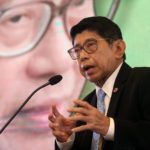Are the government finding any excuse to delay elections?
THE LEGISLATIVE assembly’s unexpected and unprecedented rejection of all seven candidates nominated as new Election Commission members could be yet another excuse for an election delay, although government figures have dismissed the possibility.
Observers and critics have suspected that the National Legislative Assembly (NLA) got “some instruction” when it voted on Thursday not to endorse any of the nominations suggested by the selection committee, that also includes the assembly’s president, Pornpetch Wichitcholchai. However, Deputy Prime Minister Prawit Wongsuwan yesterday denied the ruling junta had ordered the NLA to reject all the candidates. He said the assembly members made the decision entirely on their own and the people in power had nothing to do with the outcome.
Deputy Prime Minister Wissanu Krea-ngam said yesterday that he did not think the NLA vote would impact the road map to election. Thursday’s move by the NLA is the latest in a series of developments that have aroused suspicion of repeated attempts to delay the next election.
Prominent banker Banyong Pongpanich, once a member of a government-appointed committee, has implied that NLA members thought people were stupid enough to believe that lawmakers acted independently. “I wonder if we are being ruled by undisciplined people,” he said in his Facebook message yesterday. The European Union again has expressed concern of a possible election delay after the NLA vote on Thursday.
The EU ambassador to Thailand, Pirkka Tapiola, raised the matter when he met Deputy Prime Minister Prajin Juntong yesterday.New process could take six months After the military coup in May 2014, the junta set a loose “road map for the return to democracy” that contains timeframes for what has to be done before the next election is held. The people in power and the organs responsible for key duties, such as issuing laws necessary for holding an election, often opted for the maximum timeframe although they could complete the task with less time. Sometimes they even added more time to the original timeframe.
For instance, the NLA in January voted to postpone enforcement of the election law for 90 days, arguing that political parties need more time to complete tasks required under the Political Parties Act. However, politicians maintained that the move was aimed at delaying the next election and allowing the junta more time to stay in power. With postponement of the election law’s enforcement, the election is now expected to be held in February or March next year, rather than this November, as originally promised by Prime Minister Prayut Chan-o-cha. And now that the NLA has rejected all EC candidates, there is concern that the election could be delayed even further.
The process of selecting a new set of candidates and appointing new EC members could take up to six more months. A new selection committee may need to be appointed, although Pornpetch, a panel member himself, said the old committee could still do the job. However, the old panel’s legitimacy may be questioned after all its nominations were rejected. Also, it could be more difficult to find qualified applicants to meet stringent qualities set by the Constitution. And many likely applicants might be too discouraged to apply for fear that they could be rejected and have their reputation damaged.
Even after new election commissioners are appointed, they will need time to familiarise themselves with the new tasks and may require an extended timeframe to prepare for the next election. According to the Constitution and the Election Commission Act, the current EC members are authorised to hold elections although their term has not been extended. The laws allow them to assume a caretaker function as long as new election commissioners are unavailable.
But there has been concern that their legitimacy may be questioned and petitions could be filed with the Constitutional Court to rule on the powers of election commissioners with only caretaker authority.
Source: Nation





